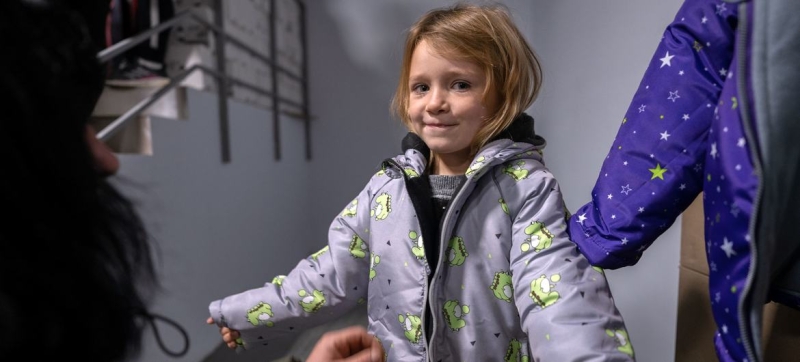
UNICEF provides aid, including clothing, to children of Ukraine. Ukraine: 1000 days of war Peace and security
At least 2,406 children have been killed or injured since Russia launched a full-scale invasion of Ukraine on February 24, 2022, the United Nations Children’s Fund (UNICEF) said, citing the latest verified data, on the eve of a tragic date – Tuesday marks exactly 1,000 days since the start of the war.
16 children are killed or injured every week
659 children were killed and 1,747 were injured, UNICEF said. On average, 16 children are killed or injured across Ukraine every week.
Just last week, a mother and her three children, the youngest of whom was just two months old, were killed when a bomb hit an apartment building in the central Ukrainian city of Krivoy Rog. Children in the Donbas region in the east of the country have been living in a state of conflict for more than 10 years, UNICEF emphasizes.
“Millions of children live in constant fear, many of them spending up to six hours a day hiding in basements under the sound of air-raid sirens,” said UNICEF Executive Director Catherine Russell.
“Without continued and enhanced support for children, the psychological wounds of this war will echo across generations,” she added.
People are in dire need of warmth, water and medical care
Many Ukrainian children have been forced to flee their homes. They face water shortages, power outages, and heating cuts, including during the cold winter months.
Between March 22 and August 31, 2024, attacks on energy infrastructure across Ukraine destroyed about nine gigawatts of generating capacity. That’s half of what Ukraine needs for the winter.
In frontline areas, nearly three million people are in dire need of warmth, safe water, and medical care, UNICEF reports. About 1.7 million children do not have access to safe water.
Attacks on Schools and Hospitals
According to the Children’s Fund, schools and hospitals continue to be attacked. In 1,000 days, at least 1,496 educational institutions and 662 medical facilities have been damaged or destroyed.
“Schools, hospitals and civilian infrastructure are not just buildings; they are also destroyed by violence. “They are a lifeline and a symbol of hope,” Russell said.
“The children of Ukraine must be protected from the ongoing horrors of this war,” she added.
Reconstruction and Humanitarian Aid: Ukrainian Women on the Front Line
Despite the risks, Ukrainian women are actively involved in humanitarian work and reconstruction efforts. Women’s initiatives and women’s rights organizations are playing a vital role in the current crisis, but they face a systemic lack of funding.
Women are also eager to contribute to economic growth: every second new company that is currently registered in the country is founded by a woman. At the same time, according to the Organisation for Economic Co-operation and Development (OECD), less than one percent of the funding allocated for Ukraine’s recovery is intended to strengthen efforts to advance gender equality.
OECD countries, the European Union, the World Bank and a number of other international financial institutions, non-governmental organisations and private sector companies have committed to addressing the funding gap through the Alliance for a Gender-Responsive and Inclusive Recovery, launched in June by the governments of Ukraine and Germany with the support of UN Women.
Ukrainian women’s organizations were among the first to respond to the humanitarian crisis 1,000 days ago. Working with 54 organizations, UN Women and partners provided assistance to more than 100,000 women and girls. UN Women also actively supports the government and civil society in further promoting laws and policies that promote women’s empowerment.
The organization calls for an end to the war and attacks on civilians.
UNESCO condemns strikes on Odessa’s historic center
UNESCO on Monday condemned the large-scale Russian attack on Odessa’s historic center, which has been protected by the UNESCO World Heritage Convention since January 2023.
According to preliminary According to the data, as a result of the strikes on the night of November 15, about twenty buildings were damaged, including historical, religious and educational ones. UNESCO noted that this attack is contrary to international law.
A UNESCO representative held talks with the Odessa authorities on Friday, and over the weekend a mission of the organization’s experts left for the site, which must assess the damage caused to the historical buildings.
UNESCO once again calls for an end to attacks on cultural sites protected in accordance with international regulations.
